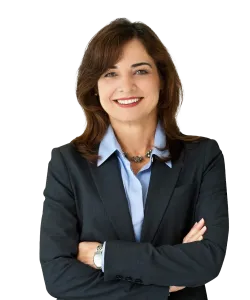Leadership Starts with People: A Q&A with Cristina Carvalho
ArentFox Schiff partner discusses what makes a strong leader, how to cultivate long-lasting client relationships, the realities of a global practice, and more.
Cristina Carvalho is a partner at ArentFox Schiff and is currently a member of the firm’s Executive Committee, having previously served as Firmwide Managing Partner from 2016 to 2023. Over nearly three decades with the firm, she has built and led an international practice focused on global intellectual property portfolio management, licensing, and technology transactions for leading US and foreign companies. Cristina counsels clients across industries—from food and beverage to consumer products—on brand strategy, protection, and enforcement. She regularly oversees large teams managing complex IP portfolios and transactions.
Widely recognized as a leader in her field, Cristina was recently named to Washingtonian’s “Most Powerful Women in Washington” list for the fifth consecutive time. In this Q&A, Cristina discusses her people-centered leadership style and business-first approach to the practice of law.
Q: Washingtonian’s list profiles powerful and influential women who have made an impact in their respective fields. Thinking about the evolution of your career and this recognition, what do you think leadership really means?
A: For me, leadership isn’t a title; it’s based on relationships and it starts with people. It’s about earning trust and listening, so folks feel heard and valued. When there is trust, a leader can have honest conversations and make difficult decisions with the support of their teams. Even those who may not necessarily agree are more likely to accept decisions when they trust that leadership is acting in the best interest of the firm.
Over many years at ArentFox Schiff, I have learned that trust is built quietly and consistently: by showing up prepared, following through, and approaching difficult decisions with transparency and empathy.
The Washingtonian recognition wasn’t a solo act. It reflects my shared journey with my partners, colleagues, and clients.
Q: Speaking of clients, you have several that have been with you for many years. How did you cultivate those relationships and what advice do you have for attorneys starting out in their careers?
A: Being a great lawyer gets you in the door, but it rarely sets you apart in a market full of great lawyers. What does set you apart is combining your legal skills with practical business advice and a real commitment to the client’s goals. I always start by asking, “What is the end game?” and then build a legal strategy that helps the business get there.
I’ve had the opportunity to stand in for in‑house lawyers over the years, which provided a firsthand look at their world—limited time, competing priorities, and the need to deliver actionable recommendations to internal clients. This experience has helped shape how I support in‑house counsel and focus on making their lives easier. Clear and objective answers, options with associated risks, and being truly invested in the successful outcome all help build solid relationships.
I also try to get to know my clients on a personal level, because I believe that long‑term professional relationships come from genuine connections. First and foremost, I care about my clients as people. I make myself available beyond providing legal guidance, such as giving professional development advice and helping them navigate their own in-house dynamics.
Lawyers starting out should master their craft, but also build the skills that earn trust: listen more than you talk, take ownership, write plainly, and view every matter through the client’s business lens.
Q: Having long had an international practice, what has this experience taught you about how to counsel global organizations?
A: One key lesson I’ve learned from having an international practice is that “best practices” don’t travel perfectly. What works in the US may be impractical—or not even legally possible—elsewhere. Advising global organizations, then, is part law, part culture. I’ve managed portfolios and deals across Latin America, Europe, and the US, and I’ve seen how corporate structures, regulatory landscapes, and enforcement realities vary widely.
The key is to align legal recommendations with local constraints and business goals while keeping the global plan coherent. And just as important: understand the people behind the decisions. A business lead or in-house counsel in Brazil may see risk differently than one in the US. Listening carefully, understanding the different legal nuances, and adjusting how you communicate builds successful lawyer-client relationships and helps move complex projects forward.
Q: Throughout your career, you have had mentors that provided you with guidance and served as a mentor to others. What do you think makes for a successful mentor-mentee relationship and how can both parties get the most out of these relationships?
A: Many of my mentors were informal; some probably never knew I thought of them as mentors. I learned by watching how great partners handled clients, tough questions, and their teams, and I tried emulating their behavior. I call it passive mentorship.
I’ve also mentored junior lawyers more formally, and the best relationships start with clear expectations from the mentee. Tell me what you want to develop—technical proficiency, client management, leadership skills—and we can focus on what matters most from the outset.
Good mentorship is candid, consistent, and two‑sided. The mentor offers experience‑based advice and real feedback, and the mentee brings curiosity, preparation, and follow‑through by putting the advice into practice and reporting back.
Contacts
- Related Industries
- Related Practices
- International
